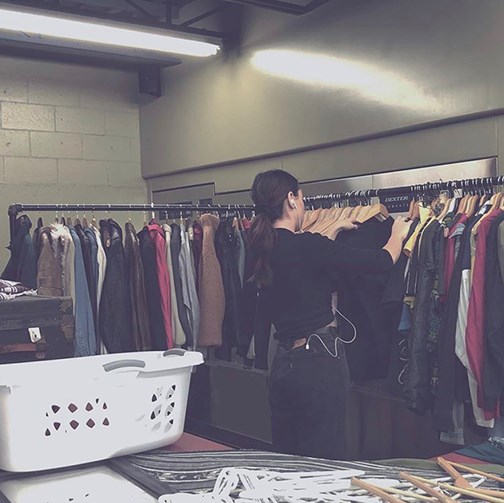
If you walk downstairs into JasperÔÇÖs thrift store youÔÇÖll find all sorts of hidden gems while sorting through the items others have kindly donated to the community.
There you can find pieces that may have lasted throughout generations, made long before the modern notion of ÔÇśfast fashionÔÇÖ.
But what is fast fashion?
ÔÇťFast fashion utilizes trend replication, rapid production, and low quality materials in order to bring inexpensive styles to the public,ÔÇŁ says The Good Trade magazine.
ÔÇťPeople debate what came firstÔÇöthe desire for fresh looks at an alarming rate or the industryÔÇÖs top players convincing us that we are behind trends as soon as we see them being worn.ÔÇŁ
Fast fashion is the opposite of sustainability and involves cheap, quick-to-sell and poorly made garments of clothing.
When you're out shopping looking for that piece for your dinner date this Friday night or shopping those Boxing Day deals, do you ever think about the disturbing truth of the environmental impact hidden behind what's going on when you're buying these garments?
The textile industry is a large consumer of water - estimated to use 10,000 litres to cultivate only one kilogram of cotton. Besides water, energy and not to mention the harmful chemicals that are required to produce fabrics need to be considered.
The fashion system was broken long ago.
Globally we produce up to 100 billion pieces of clothing a year, but where are all these items going and who is being affected by this production? The planet and the people making them in poor conditions.
And what happens to the billions of pieces from previous years?
The different colors or patterns you are seeing might be appealing, but how was that colour created? Textile dyeing is one of the largest polluters in the world, contaminating water sources globally.
Polyester is one of the most commonly used types of material and, with that being said, what about the microfibres that are unnoticeably shedding in the wash and adding more and more plastic waste into our oceans?
But us consumers are only trying to keep up with the latest fashion trends. The fashion industry has us sold on new looks on the trendiest items and must-haves as much as every two weeks, influencing us through commercials, billboards, social media, influencers - itÔÇÖs overwhelming.
Consumers are said to buy more articles yearly, but on average we do not keep the clothes as long as we used to.
If clothing seems as something fast, cheap and disposable, that's exactly what consumers will start to see it as.
So what is the solution to this problem? We can't bring the mass production to a halt but we can slow it down by attempts of minimalizing or recycling and reusing.
Instead of buying new garments, why not spend that money at your local church or thrift stores?
Clothing made cheaply is full of microfibers that will sit in landfills for years and years.
There is no shortage of clothing or textiles around already, why not source what we already have?
I have collected vintage items over the last few years from local sources and abroad - only selecting the highest quality and well looked after items.
My hobby turned into a small side business recently when I launched Variety Collective and was lucky enough to partner with SnowDome Coffee Bar to hold pop-up thrift events in Jasper - and the feedback and support was astonishing.
Jasper, a town filled with eco-conscious and environmentally-minded people, were excited to see more vintage, reclaimed and reused clothes for sale.
Jasper is great in that sense, as every Monday, Wednesday and Thursday the Jasper United Church basement thrift store is swarmed with people looking through the donated items for a great price.
Do your research when it comes to clothing. We can so easily be creative with reused garments by altering, repairing, upcycling it or swapping out with friends.
Research sustainable resources for clothing, such as Fairtrade or the Better Cotton Initiative and avoid big box companies.
Like environmental journalist Lucy Siegle said, ÔÇťFast fashion isnÔÇÖt free. Someone, somewhere is paying.ÔÇŁ
Jaclyn Dacyk
Variety Collective Thrifted and Vintage Clothing
@varietycollective



